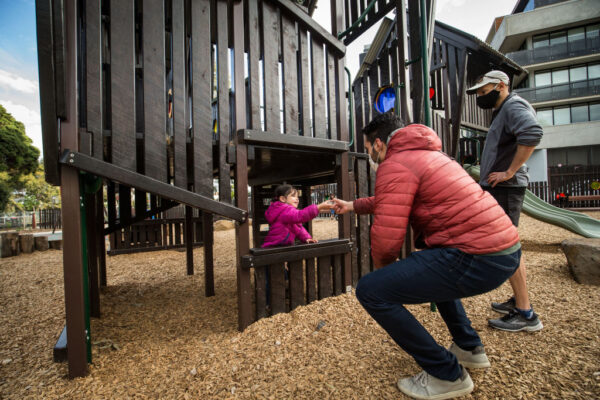Smacking: Discipline or Abuse?
CommentarySmacking, or spanking—as the Americans would call it—disobedient children has a history as old as the existence of humanity. But lately, there have been incessant demands to ban the practice by making it illegal. In Australia, the topic has been recently debated on the Today show on Channel 9, and there have been numerous newspaper articles that seek to contribute to a debate that has polarised people. Happy Families, a website devoted to family relationships, advocates for the abolition of all forms of corporal punishment of children. It refers to an ABC survey, indicating that “Older Australians tend to agree that ‘smacking is an acceptable form of discipline at higher levels than do younger Australians.” It points to research revealing that “the biggest predictors of who will smack are low-income, low education, high religiosity” people, or members of “minority cultures, races, or nationalities.” This research finding, in focusing on identifiable groups, is an example of stereotyping because, in reality, smacking occurs in all social groups. In any event, a poll on social media revealed that only 15 percent of Australians agree that smacking should be made illegal. The debate about whether “smacking” should be illegal is prone to overlook the difficulties associated with any attempt to define the concept. Wikipedia defines smacking as “the deliberate infliction of physical pain as a response to undesired behaviour by students.” In Australia, corporal punishment was practised in schools until the 1980s. It sometimes involved the caning of children, striking them on the buttocks or on the palms of their hands. In such cases, the teachers acted in loco parentis, taking the place of the parents to discipline their children. While this practice is now abandoned in Australian schools, the debate has shifted to the propriety of corporal punishment of children by their parents at home. A father scolds his teenage daughter, circa 1945. (FPG/Hulton Archive/Getty Images) How Would Authorities Enforce a Smacking Ban? The Global Initiative to End all Corporal Punishment of Children (“Initiative”) insists that all forms of corporal punishment should be abolished. The Initiative, on its website, praises Wales where, since March 21, all forms of corporal punishment of children are prohibited. Specifically, it informs that the abolition of corporal punishment “means that parents and other adults acting in a parental capacity will no longer be allowed to use physical punishment, giving children the same legal protection from violence as adults.” As “smacking” is obviously one form of corporal punishment, the question should be asked as to whether any Australian legislation should address only smacking or all forms of corporal punishment. In addition, even if smacking and other forms of corporal punishment were made illegal, it would be difficult to enforce the ban. Indeed, it is not altogether preposterous to expect zealous law enforcement authorities to be given the power to invade Australian homes to learn how parents discipline their children. Would the authorities periodically interview children about their treatment by their parents? If so, would these interviews take place at school without the knowledge of the parents? Would the legislation encourage children to start legal action against their parents if they have been smacked or otherwise disciplined? These are meaningful questions, and any instance of authoritarian overreach would, at least potentially, violate the privacy of the family unit and the rights of parents to educate their children. Is Smacking Harmful to the Child? So, should smacking and other forms of corporal punishment be made illegal? According to the Royal Australasian College of Physicians (pdf), smacking is harmful to children and violates their human rights. Their view is compatible with Happy Families’ opinion that smacking kids breeds violence, breeds dysfunction, undermines self-worth and well-being, and ruptures relationships. The Initiative equally indicates that corporal punishment of children constitutes “a violation of their human rights” and that it “is associated with numerous negative outcomes, including physical injury and other health impacts, atypical brain function, emotional harm such as depression, increased aggression, anxiety and low self-esteem, damage to the parent-child relationship, and damage to cognitive development and educational outcomes.” Parent and children enjoy time at a playground in Brunswick in Melbourne, Australia, on Sept. 3, 2021. (Darrian Traynor/Getty Images) Article 19(1) of the International Convention on the Rights of the Child imposes an obligation on countries to “take all appropriate legislative, administrative, social and educational measures to protect the child from all forms of physical or mental violence, injury or abuse, neglect or negligent treatment, maltreatment or exploitation, including sexual abuse,

Commentary
Smacking, or spanking—as the Americans would call it—disobedient children has a history as old as the existence of humanity. But lately, there have been incessant demands to ban the practice by making it illegal.
In Australia, the topic has been recently debated on the Today show on Channel 9, and there have been numerous newspaper articles that seek to contribute to a debate that has polarised people.
Happy Families, a website devoted to family relationships, advocates for the abolition of all forms of corporal punishment of children. It refers to an ABC survey, indicating that “Older Australians tend to agree that ‘smacking is an acceptable form of discipline at higher levels than do younger Australians.”
It points to research revealing that “the biggest predictors of who will smack are low-income, low education, high religiosity” people, or members of “minority cultures, races, or nationalities.”
This research finding, in focusing on identifiable groups, is an example of stereotyping because, in reality, smacking occurs in all social groups.
In any event, a poll on social media revealed that only 15 percent of Australians agree that smacking should be made illegal.
The debate about whether “smacking” should be illegal is prone to overlook the difficulties associated with any attempt to define the concept. Wikipedia defines smacking as “the deliberate infliction of physical pain as a response to undesired behaviour by students.”
In Australia, corporal punishment was practised in schools until the 1980s. It sometimes involved the caning of children, striking them on the buttocks or on the palms of their hands. In such cases, the teachers acted in loco parentis, taking the place of the parents to discipline their children.
While this practice is now abandoned in Australian schools, the debate has shifted to the propriety of corporal punishment of children by their parents at home.

How Would Authorities Enforce a Smacking Ban?
The Global Initiative to End all Corporal Punishment of Children (“Initiative”) insists that all forms of corporal punishment should be abolished. The Initiative, on its website, praises Wales where, since March 21, all forms of corporal punishment of children are prohibited.
Specifically, it informs that the abolition of corporal punishment “means that parents and other adults acting in a parental capacity will no longer be allowed to use physical punishment, giving children the same legal protection from violence as adults.”
As “smacking” is obviously one form of corporal punishment, the question should be asked as to whether any Australian legislation should address only smacking or all forms of corporal punishment.
In addition, even if smacking and other forms of corporal punishment were made illegal, it would be difficult to enforce the ban.
Indeed, it is not altogether preposterous to expect zealous law enforcement authorities to be given the power to invade Australian homes to learn how parents discipline their children.
Would the authorities periodically interview children about their treatment by their parents? If so, would these interviews take place at school without the knowledge of the parents? Would the legislation encourage children to start legal action against their parents if they have been smacked or otherwise disciplined?
These are meaningful questions, and any instance of authoritarian overreach would, at least potentially, violate the privacy of the family unit and the rights of parents to educate their children.
Is Smacking Harmful to the Child?
So, should smacking and other forms of corporal punishment be made illegal?
According to the Royal Australasian College of Physicians (pdf), smacking is harmful to children and violates their human rights. Their view is compatible with Happy Families’ opinion that smacking kids breeds violence, breeds dysfunction, undermines self-worth and well-being, and ruptures relationships.
The Initiative equally indicates that corporal punishment of children constitutes “a violation of their human rights” and that it “is associated with numerous negative outcomes, including physical injury and other health impacts, atypical brain function, emotional harm such as depression, increased aggression, anxiety and low self-esteem, damage to the parent-child relationship, and damage to cognitive development and educational outcomes.”

Article 19(1) of the International Convention on the Rights of the Child imposes an obligation on countries to “take all appropriate legislative, administrative, social and educational measures to protect the child from all forms of physical or mental violence, injury or abuse, neglect or negligent treatment, maltreatment or exploitation, including sexual abuse, while in the care of parent(s).”
Although the Convention—ratified by Australia on Dec. 17, 1990—stresses that the primary consideration of the authorities is always to make decisions that are in “the best interests of the child,” it does not impose obligations on individuals. It is, however, a powerful statement by the international community on how children should be treated.
Nevertheless, unless “smacking” is characterised as a form of physical violence, the Convention offers little guidance on its legality.
Instead, it focuses on odious practices, like torture, abduction, and sexual exploitation, whilst at the same time confirming, in Article 14(1) “the rights and duties of the parents … to provide direction to the child … in a manner consistent with the evolving capacities of the child.”
The smacking debate is conveniently, but unsatisfactorily, framed as a contest between proponents and opponents of corporal punishment. However, “smacking” is an indeterminate concept, the meaning of which needs to be filled in.
It might be a more enlightened strategy to seek to distinguish between instances of corporal punishment that serve an educational and disciplinarian objective, on the one hand, and punishment that is merely a gratuitous expression of cruelty, on the other.
Whereas a civilised society might tolerate the former by respecting parents’ right “to provide direction” to their children, the latter would be illegal.
Only common sense and a desire to nurture the best interests of children will secure lasting and positive change. The present debate about smacking has a long way to go before any discernible consensus on this issue will be achieved.
Views expressed in this article are the opinions of the author and do not necessarily reflect the views of The Epoch Times.












